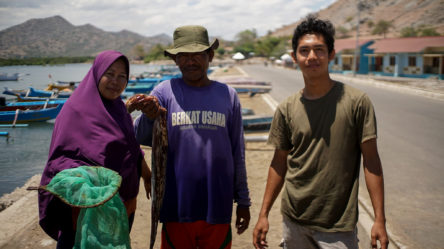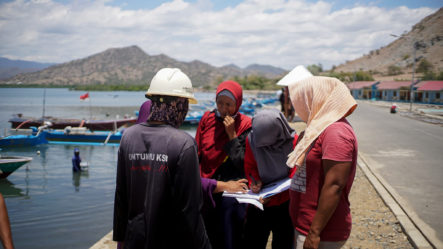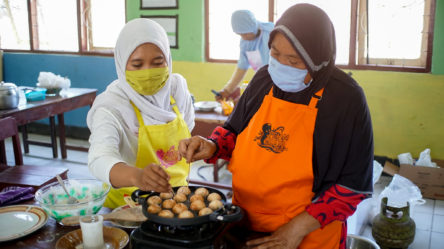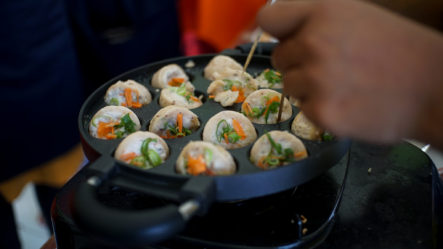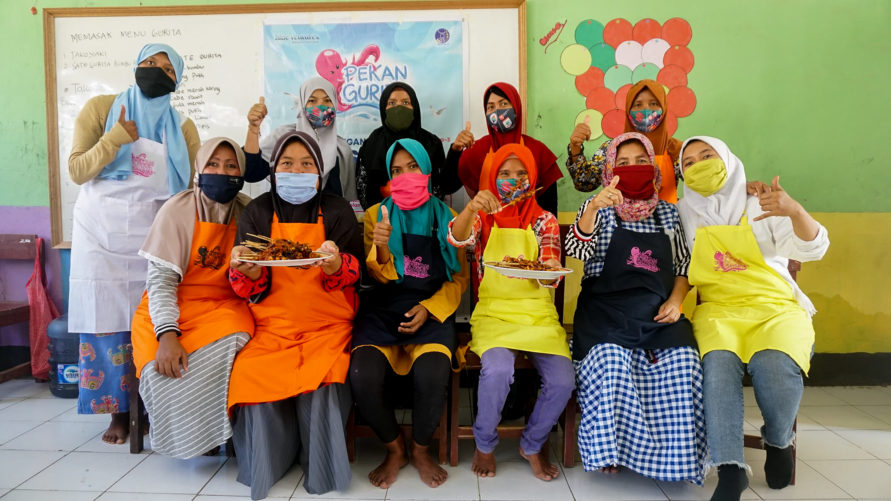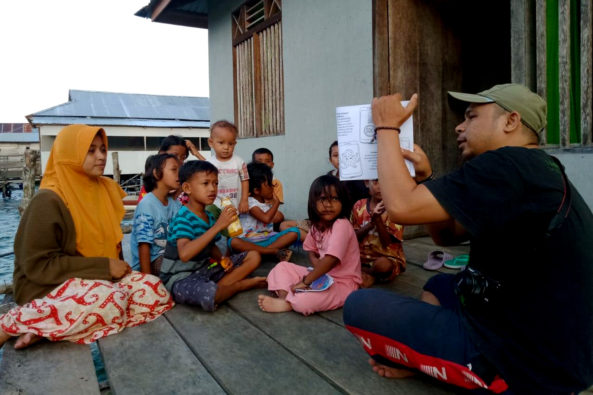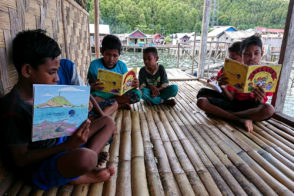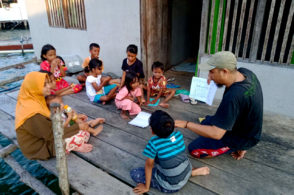This post is also available in:
 Indonesian
Indonesian
An octopus-shaped kite flies high in the sky above Kenawa Island, West Sumbawa, West Nusa Tenggara, Indonesia. The kite was handmade by an octopus fishers group, locally referred to as Pelita, in Poto Tano Village for last month’s kite festival on the island.
After sailing across the Alas Strait which connects Poto Tano with the neighbouring Lombok Island in the west, this village is the gateway to Sumbawa Island. As a marine tourism destination, Poto Tano has a beautiful port, surrounded by crystal clear water.
Juang Laut Lestari (JARI) translates as “endeavouring for sustainable seas” – the core of JARI’s community work.In this village, JARI has been working with the community to support them in monitoring their octopus catch so that they can start to manage their octopus fisheries resources sustainably. JARI is a marine conservation organisation based in Lombok, and one of Blue Ventures’ partners in Indonesia. Juang Laut Lestari (JARI) translates as “endeavouring for sustainable seas” – the core of JARI’s community work.
It was the first week of October 2020, an important week for the Pelita group – whose name is short for Perkumpulan Nelayan Gurita (octopus fishers group). “At the moment, Pelita initiative is still in its early stages, to inspire octopus fishers to connect and work together. Hopefully, soon, Pelita will be acknowledged by the community as a hub that unites and empowers octopus fishers in the village,” said Hani Nusantari (JARI).
From 1st to the 9th of October, together with JARI, Pelita and the Poto Tano community enjoyed a week of awareness raising activities around community-based octopus fisheries management in the village, to celebrate World Octopus Day. The goal was to raise awareness about the importance of sustainable octopus fisheries management among fishers and their families, the community and the government.
The theme of Octopus Week is to introduce octopus as an inspiration for sustainable fisheries management. We hope that everyone who participates during the event will be inspired to make the dream of sustainable octopus fisheries come true,” Hani added.
The activities included an introduction to participatory octopus fisheries monitoring, an octopus cooking demonstration with women in the village, ‘Sarasehan’ (informal discussions between the various groups who are involved in fisheries management), and an educational trip to a nearby coral reef.
Getting hands on with octopus
Octopus Week started with participatory octopus catch monitoring, which is when fishers and community data collectors record the weight, mantle length, fishing location and sex of the octopus in their catch. This data helps the community to better understand the potential of their octopus resources, enabling them to make more informed decisions about how to manage their fishery.
Aydir and Ningsih, JARI’s field staff who collect data with the community here, supported the octopus fishers and their families to monitor their catch throughout the week.
Following participatory catch monitoring, JARI then interprets the data and creates accessible tools and storytelling methods to explain what the data means to the community.
We involve women and young people in this participatory monitoring, to introduce them to the importance of knowing and understanding the potential of their octopus fisheries, so that they can start thinking about how to manage them,” said Hani.
Women from Poto Tano also had a great time learning how to prepare takoyaki – balls made with a mixture of whole wheat batter, eggs, soy sauce and dashi (an umami-flavoured stock made from seaweed), stuffed with chopped grilled octopus. The takoyaki were finished with satay sauce made with Lombok’s signature sweet yet spicy rembiga seasoning.
Many of the women were very enthusiastic as they watched the demonstration, which was led by the JARI team. Afterwards, the women made some delicious octopus dishes of their own to take back home to their families.
Understanding the challenges of managing octopus fisheries
“We have to admit that we can still find destructive fishing activities in the waters of our village, mostly by people from other villages. It is a challenge for us to stop these activities that bring negative impacts to the environment and our people,” Firmansyah from the village government, shared with the attendees of Sarasehan – the name given to the octopus fisheries management discussions held on Octopus Day, which invited not only octopus fishers and village government officials, but also representatives from the Marine and Fisheries Agency, the Government Tourism Agency, tourism awareness groups, community fisheries resources surveillance groups, and fellow conservation organisation Wildlife Conservation Society (WCS) Indonesia.
The discussions aimed to connect these groups with each other and open up communications around community-based fisheries management in Poto Tano. Sarasehan also involved a data feedback session, where the data collected by Aydir, Ningsih and the fishers earlier in the week was presented back to the wider community.
As fishers, we feel wronged by destructive fishing activities, such as the use of compressors for fishing,” said Burhanudin, an octopus fisher from Poto Tano.
Compressor fishing is the practice of collecting marine species (primarily fish, but also octopus) underwater while the fisher breathes air supplied from a compressor (via a hose) on a boat on the surface. The use of compressors for fishing carries a major health risk for the people doing it, and is often destructive to the marine environment too. “They dive using compressors, and usually use spears for fishing – but destroying corals at the same time,” Burhanudin added.
Throughout the discussions, JARI witnessed a strong willingness from the village government to collaborate with the groups they had met to better manage their fisheries resources.Throughout the discussions, JARI witnessed a strong willingness from the village government to collaborate with the groups they had met to better manage their fisheries resources. “Some time ago, we had a meeting with some other village heads and we are now in the process of preparing an agreement to prohibit destructive fishing, as we think that it needs to be regulated more seriously,” said M. Nur Hasan, the Head of Poto Tano Village.
Educating the younger generation
During Sarasehan, JARI also launched a story book about octopus for children in the village. The picture book is about octopus fisheries and the life cycle of the octopus, and includes pages which can be coloured in by the children. JARI has since shared this educational tool with local schools and Blue Ventures’ partners network, which supports community-based fisheries management across eight provinces in Indonesia.
I think this story book from JARI is important for early conservation education for children living in coastal villages,” Christopel Paino who works with Japesda (one of the organisations within the partner network), expressed his appreciation after reading the book to children in the community where he works.
Blessed with perfect weather, JARI and the community in Poto Tano closed the week with a diving trip to a nearby coral reef. They also invited fishers and some young people in the village to try SCUBA diving. Having this unique opportunity to explore the reef (the home of the octopus) up close, reminded everyone that this is an ecosystem that the community needs to work together to protect, for their own future.
“I’m impressed, I’m interested in preserving our coral reefs, even rehabilitating the ones that are already damaged,” Amir said in hope, who is a local octopus fisher from Poto Tano.
Learn how Japesda are sharing octopus knowledge – virtually!
Meet Maryana the octopus fisherwoman
*The Octopus Week activities followed the relevant health and safety protocols and had COVID-19 mitigation in place.


